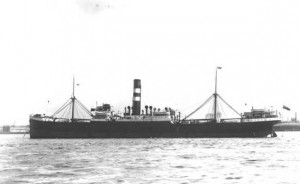Licensing
The license of the Rose and Crown, Ratley, was transferred from Mr George Steele to Mr Jabez Clutterbuck of Farnborough.
Motor Cases
William John Cooper, engineer, 15 South Street, Grimsbury, was summoned for driving a motor-cycle and failing to produce a license at Ratley on May 30th. Defendant pleaded guilty. PC Heavens proved the case and said defendant looked in his bag for it. Defendant said he had the license with him, but forgot to look in his hip-pocket where it was. Fined 10s.
John W. Hyam, draper, 24 Leicester Street, Leamington, was summoned for driving a motor-cycle and failing to produce a license at Ratley on June 6th. Defendant pleaded guilty, Inspector Packe said defendant produced a licence which expired on May 21st. Fined £1.
John Price Summers, coal dealer, Brackley, was summoned for driving a motor-cycle with rear number obscured, at Ratley, on June 13th. Defendant pleaded guilty. Inspector Packe proved the case, and said that defendant’s friend was riding on the back of the cycle, and his coat covered the number. Defendant was fined 10s.
Unburied Carcase
Jane Charlton, Brookhampton, Kineton was summoned for failing to bury the carcase of a lamb at Combroke, in June 18th. Defendant’s son said he could not find the lamb which was very small. PC Taylor said from information received he visited Brookhampton, and found the carcase of a lamb, which was putrid. He proceeded to the farm and met the defendant’s son, and asked him when he was round shepherding last. Mr Charlton said, ‘Are you come about the lamb?’ and witness replied in the affirmative. Mr Charlton said he knew the lamb was dead, but could not find it. He promised to bury it the next morning. Fined 10s.
Drunk and Disorderly
Richard Taylor, labourer, Warmington, was charged with being drunk and disorderly at Warmington on June 19th. Defendant pleaded guilty. PC Heavens proved the case. Defendant said he had a little drop too much, and it took effect on him. Fined 2s. 6d.
Wilful Damage at Combroke
Munday Hobday (18), ploughboy, Combroke; Edward Oldham (14), ploughboy, Combroke; and Philip Hancock (12), schoolboy, Combroke, were summoned for throwing stones to damage of property at Combroke on June 15th. Defendants stated that they threw stones at the washhouse windows, but the glass was all broken previously. Alfred Oldham said he saw the three boys throw stones, but they did not break any glass whilst he was there. PC Taylor said the boys admitted breaking panes of glass. Mr W. W. Hutton, estate agent for Lord Willougby de Broke, said that his Lordship decided to prosecute as so much damage had been done to the window at 4s. Mr Oldham said the window was already smashed. Mrs Hancock said the panes had been smashed for months and months. The Chairman said Hobday was big enough to know better, and would be fined 2s 6d. The other defendants would be fined 1s each.
Alleged Attempted Suicide
George E. Boulton Kineton, was summoned for attempting suicide by taking poison. Inspector Packe said that on the 21st of June he received information of this affair, and that morning saw the defendant and told him he had a warrant for his arrest for drinking a quantity of ringworm dressing. He said, ‘Yes, I am guilty. I am very sorry. I had been drinking for two or three days previously, but I vow I shall never have any more drink nor do such a foolish thing again.’ Defendant was discharged on entering into a bond of £50 to be of good behaviour for the next twelve months.
Banbury Guardian, July 1915
